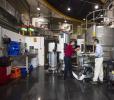
Chronic kidney disease of unknown origin
In 2017, ANSTO's CEO signed a Memorandum of Understanding with Sri Lanka to work together to investigate the epidemiology of Chronic Kidney Disease of unknown origin (CKDu).

Showing 541 - 560 of 1679 results

In 2017, ANSTO's CEO signed a Memorandum of Understanding with Sri Lanka to work together to investigate the epidemiology of Chronic Kidney Disease of unknown origin (CKDu).

ANSTO provides eduroam services for partnering institutions in Australia and around the world.
A groundbreaking international study has provided new insights into global fossil methane emissions, using innovative multi-isotopic atmospheric measurements.

ANSTO offers a diverse range of career opportunities within science, engineering, corporate services and trade disciplines.
ANSTO facilitating coordinated effort to find the nexus that leads to chronic kidney disease of unknown origin
An unusual and very exciting form of carbon - that can be created by drawing on paper - looks to hold the key to real-time, high throughput DNA sequencing, a technique that would revolutionise medical research and testing.
Phenomenon predicted by Nobel Prize recipient
A special inaugural event held by ANSTO at its Australian Synchrotron for more than 30 funding organisations has showcased the first of the $100 million BRIGHT Program’s brand new, state-of-the-art beamlines.
The Detection & Imaging group builds on ANSTO’s 70-year history of scientific achievements and contributions in meeting the nuclear needs of industry, globally.
Tool developed for producing F-18 radiopharmaceuticals for PET imaging.
ANSTO contributes to major study on global warming by measuring methane and carbon monoxide trapped in ice.
Research collaboration with University of Sydney focuses on a personalised approach to cancer treatment.
Dr Linda Croton, a Research Fellow at Monash University, has been awarded the 2020 ANSTO Australian Synchrotron Stephen Wilkins Thesis medal for her outstanding work using synchrotron-based X-ray for brain imaging.
Exploring the interaction of polystyrene nanoplastics and blood plasma proteins.
A long-standing collaboration led biomedical researchers from the University of Sydney has recently achieved success with the recent announcement of an innovative bone implant that significantly reduces rejection and inflammation.